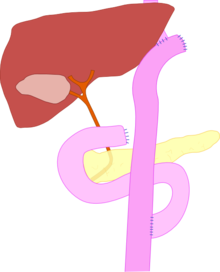| Hereditary diffuse gastric cancer | |
|---|---|
| Other names | HDGC |
 | |
| Diagram demonstrating the result of a total gastrectomy, the most common prophylactic treatment of HDGC. In the procedure the esophagus is directly connected to the small intestine. | |
| Specialty | Oncology, Gastroenterology |
| Complications | Lobular breast cancer |
| Usual onset | 38 years of age (median) |
| Causes | Mutation of the E-cadherin gene (CDH1) |
| Risk factors | Stomach cancer |
| Treatment | Total gastrectomy |
| Frequency | 1-3% of gastric cancers |
Hereditary diffuse gastric cancer (HDGC) is an inherited genetic syndrome most often caused by an inactivating mutation in the E-cadherin gene (CDH1) located on chromosome 16.[1] Individuals who inherit an inactive copy of the CDH1 gene are at significantly elevated risk for developing stomach cancer. For this reason, individuals with these mutations will often elect to undergo prophylactic gastrectomy, or a complete removal of the stomach to prevent this cancer.[1] Mutations in CDH1 are also associated with high risk of lobular breast cancers, and may be associated with a mildly elevated risk of colon cancer.[2]
The most common form of stomach cancer associated with CDH1 mutations is diffuse-type adenocarcinoma. An estimated 70% of males and 56% of females who inherit an inactivating CDH1 mutation will develop this form of cancer by age 80. Female patients are also estimated to have a 42% lifetime risk of developing lobular breast cancer.[3] The median age of gastric cancer diagnosis in individuals with a CDH1 inactivating mutation is 38 years of age, but cases have been reported as young as 14 years of age.[4]
- ^ a b World Cancer Report 2014. World Health Organization. 2014. pp. Chapter 5.4. ISBN 978-9283204299.
- ^ van der Post, Rachel S.; Vogelaar, Ingrid P.; Carneiro, Fátima; Guilford, Parry; Huntsman, David; Hoogerbrugge, Nicoline; Caldas, Carlos; Schreiber, Karen E. Chelcun; Hardwick, Richard H. (June 2015). "Hereditary diffuse gastric cancer: updated clinical guidelines with an emphasis on germline CDH1 mutation carriers". Journal of Medical Genetics. 52 (6): 361–374. doi:10.1136/jmedgenet-2015-103094. ISSN 1468-6244. PMC 4453626. PMID 25979631.
- ^ "UpToDate". www.uptodate.com. Retrieved 2019-02-23.
- ^ Shah, Ma; Salo-Mullen, E; Stadler, Z; Ruggeri, Jm; Mirander, M; Pristyazhnyuk, Y; Zhang, L (September 2012). "De novo CDH1 mutation in a family presenting with early-onset diffuse gastric cancer". Clinical Genetics. 82 (3): 283–287. doi:10.1111/j.1399-0004.2011.01744.x. PMID 21696387. S2CID 26197100.